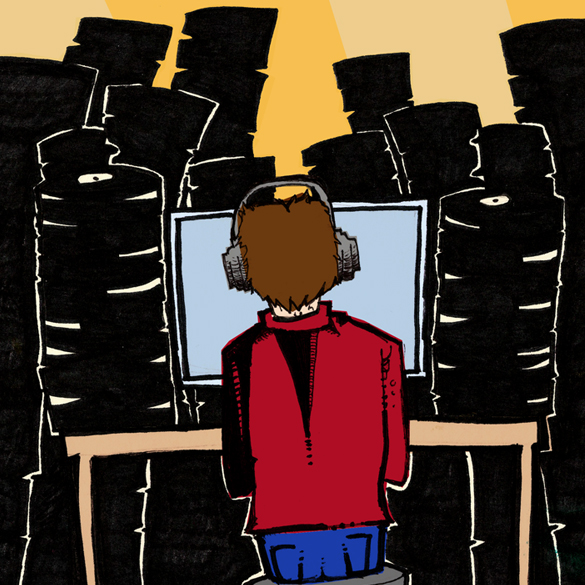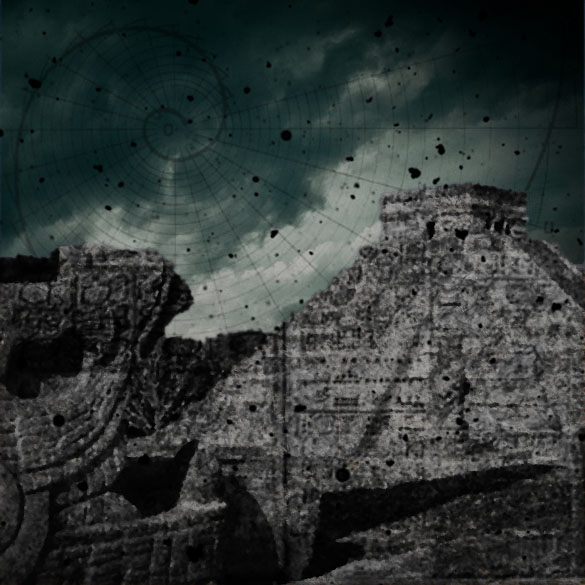Budd Carr has one of the more easily envied job that I have ever heard of; he picks out the music that goes into major motion pictures. Music Supervisor is generally his official title, and he has played that role for eighty-eight films and television show since 1984, when he got his career started with Terminator. Budd, as he insists on being called, probably is best known for his work Oliver Stone, and indeed promotion of that director’s most recent film, Savages, seemed to be the reason why Carr was giving interviews.
When I called him, he had another lined up for right after ours. I had seen Savages a few days before the interview, but, since I thought the movie was terrible, I focused our conversation more on his job generally. Budd was more than happy to oblige. He was kind, upbeat and made time to continue talking after the allotted fifteen minutes were up. By the end of our half hour interview, I coveted his job even more.
What’s a day on the job like when you’re working on a movie?
Carr: Wow, uh, that’s a good question. Every day is different. Every movie has its different challenges, and you basically prioritize the challenges. When you’re starting a picture like Savages, Oliver [Stone] got me in early—script stage—and we spent a couple hours a day for two to three days, listening to him about what he felt about the characters , what he felt about the film. He’s a voracious music listener, and all of his movies have had great music choices, and they really come from a collaborative instinct between his instinct, myself and the picture editors. We start on a day saying, “Ok, we’re gonna open in Southern California.” So, what’s the broad range of soundscape of Southern California, present day? Then you kind of prepare a hard drive, providing different takes. Classic beach music to current day Southern California listening stuff. You just kind of attack the project one step at a time. In this particular case, he wanted, basically, to get on a horse and ride off in all directions. “Get me some Mexican music, get me some current hip-hop, get me some classic songs, get me some of what what kids are listening to.” To say we end up with hard drives of hundreds and hundreds of songs is not unreasonable to say. Then the picture will tell you what works.
So Oliver will give you a basic set of scenarios that he wants music for, and then you’ll come up with some choices of songs he can have in those situation—will he then have final say in terms of what goes into the movie?
Carr: Absolutely. He’ll tell me to stop [giving him song ideas], but because he likes to listen to music prior to shooting and during shooting, we’ll burn CD’s for him—six to eight songs a cd—in genres, in artists, and I’ll get notes back. It’ll be maybe three to four weeks before I get notes back [from Oliver]. With this film, we started with twenty or so “Oliver likes” tracks. Those would be given to the picture editors, and if there were moments in the movie that [the tracks] work for them, they would then start to show them to me and then to Oliver. That’s how the process begins, and in other instances there may be scenes in the movie that specifically needs something. Or we’ve decided in looking at that particular scene we want to have something there. Oliver likes to do songs for score—because I might not have one composer, there might be multiple composers, or it might be all song. So [the process for Savages] was a search and destroy kind of thing. We’d try and score a song for a scene and it wouldn’t work. You kind of go through a process. One you get a sense of the kind of thing he likes, then you try to clear them: sometimes get approval, sometimes not get approval, sometimes budget works within, or sometimes you make shit up. The Miles De Pasajeros mashup in this movie came from a variety of Latin approaches that we had in a folder, and our Music Editor, Carl Kaller, just kind of said, “I’ve got an idea,” and took the four tracks and made a mashup of it and placed it over a scene and Oliver goes, “that works.”
When you look for music to show Oliver, where do you look?
Carr: [Sighs] You know, everywhere. Over the years you kind of build up a catalogue. Even after purging recently, I still have thousands of CD’s. You may just go back and start looking through files and go oh gosh that’s a great thing. From a current aspect, we have a list of probably a hundred plus contacts within the industry, both from major labels and indie labels, to indie artists to companies that go out and search for new bands. and we’ll put together a hitlist of things we’re looking for and they’ll send us links and myself and my coordinators will go through it and pick some things. Sometimes Pandora, sometimes that’s a resource. You moth toss a song in there and make a playlist and all of a sudden you’re listening to it in the background and you go, “what the hell is that?” One of my coordinators years ago worked for them in their kind of, think-tank they have. We use Spotify. I’ll take suggestions from cab drivers. There’s so many great resources for music, you can’t count any of them out. I had no idea when we started this project who Yuna was. [Her cover of “Here Comes the Sun” is used in the final scene of the movie.] Her album wasn’t even out, but she was the suggestion of a manager friend. It worked out great for her and for us. You have to keep yourself open to everybody’s thought.
Do you ever consider that someone in your position could maybe make the career of a small, independent artist?
Carr: It’s great if it happens, but it’s never a motivation. But I will say that since we do a variety of scales of motion pictures. The [value of the] ability to play in the major label league or major publishing league is diminished by the practicalities of what those things are about. You develop the resource. There is great indie music out there, you look for those things, and yes it makes you very happy. A specific example from this last movie, the Bruce Lash cover of “Psycho Killer,” I had that in my iTunes for six years. I couldn’t tell you if you paid who sent it to me or who found it, but when we were doing this movie I kind of went, “God man wouldn’t that be fun song to use?” And when I called Bruce—I had to find him on Myspace—I said, “by the way, I would like to use your song in an Oliver Stone movie,” and the guy on the other end of the line goes, “Who is this?” And he thinks its one of his buddies or something. But Bruce was excited to do it, and a matter of fact he sent me link this morning to some really great covers of some really great songs. There’s a lot of satisfaction in indie—when I was on Californication a lot of that stuff was indie bands. Not because we necessarily wanted to go that way, but actually because the solution was better.
So are you saying the music’s better?
Carr: Well no, you can’t say that a song by “x indie band” is always going to be better than, say, a Green Day track.
Yeah, yeah, I wasn’t try to pigeonhole you…
Carr: You can’t say that, but you may actually find an indie track that works better for scene. I’m telling you, speaking for myself though I know a bunch of other music supervisors who really enjoy the idea of using something in a film that makes people go, “What is that? Where did that come from?” I can’t tell you how many recordings we went through of “Here Comes the Sun.” Oliver didn’t choose Yuna because she was unknown and new and indie, he chose her because it was the right version of the song. But it’s kind of cool that people go at the end of the movie, “Who is that?” There’s a great satisfaction, and, yeah, there’s no question that there are examples of indie bands, and not-indie bands, that get launched by being used well in a movie or TV show.
What are you listening to right now? Who do you like?
Carr: [laughs] Who do I like? [pause] Well, right now as far as a music listener, for me it’s everything from Willie Nelson to A$AP Rocky.
That’s a good range right there.
Carr: You know, I’m a music junkie.The thing is, from the standpoint of doing this for a living, because you’re challenged with every project with something different, you end up with a very eclectic music range. Sometimes you’re involved in a project and that dumps you out into new music. I remember knowing nothing about afro-cuban music and now I have a playlist of that, and recently a friend turned me onto an artist called Sa Dingding. If you’ve never heard of her check [her music] out, she’s a huge star in China. Is it something I sit down and have a drink with? No. [laughs]
Does it ever get boring, doing your job?
Carr: Oh, no. Ok, so I get paid to listen to music and put it into films. That parts makes up for the fact that seventy-five percent of what my day is spent doing is sorting out or negotiating licensing deals. It is a job, it’s not just a game. If there is something that from time to time gets frustrating is that oftentimes you spend more time sorting out problems to get something you want than actually doing the creative stuff. That’s a reality check for us.
[At this point, Carr received another call for an interview but asked them to call back in fifteen minutes]
Do you have any specific questions about the soundtrack?
Um, no not particularly. You have a pretty interesting mix on there, going from Dylan to Yuna.
Carr: [laughs] The other thing that you should know is that Oliver is involved not only on what goes into the movie, but also what goes on in the soundtrack. I mean, he’s instrumental. He’s a classic soundtrack listener, and when I say classic I mean he still listens to albums, beginning middle and end. The reason this album goes from an M. Ward to a piece of score into Cut Copy and into a piece of score—he really challenges me. He really listens to sequences. “There was a thing that Adam did in the desert that I loved that’s not on here and we need to put it on here.” For me, doing what I do, it’s so great to have a collaborator who—obviously he’s a passionate filmmaker—he’s passionate about everything he does.
That’s interesting to hear from you because I was always under the impression that movie soundtracks were just a collection of songs that were in the movie. But you guys actually think of it as a cohesive album that somebody might sit down and listen to and get into and explore themes that you guys are trying to put together.
Carr: Well, that’s the way Oliver likes to do it. But how many people actually take a physical cd or a playlist like this and just play it? I don’t know. I mean, you probably know better than me, but I don’t know whether people do that. You’re gonna find soundtrack albums that literally are just a collection of songs that are sequenced in the same way that an artist would sequence an album—so not necessarily the sequence that they appear in the film. And then some of the directors I work with, I don’t want to say they don’t care about [the soundtrack], but they’ll say “OK that sounds great.” We did that initially with this album and gave it to Oliver, and he threw it right back at us. “This is very unimaginative, Budd.” I wasn’t offended by it, but I had to go back to work on it to see what makes sense. When we first started working together, with the Platoon soundtrack which was all score, he said to me, “make sure there’s some cannons going off and some shooting in that.” So that album has some guns on it.
Well that’s something I’ll definitely start paying more attention to, Oliver Stone soundtracks as legitimate mixes.
Carr: [laughs] Natural Born Killers if you’ve never listened to the album, get one and listen to it because it’s got a short story. We had used Nine Inch Nails [in the movie] before Trent Reznor got on board [with the soundtrack], and there was a meeting set up between Oliver and Trent to get him involved and in writing a song for it and maybe working on the soundtrack. It was a great kind of two-hearted, sitting-down and talking about music, and Trent looked at Oliver and said, “I’ll do this if you give me all of the sound from your movie—the sound effects, the dialogue, everything. Then I’ll do it. If I can’t have everything to work with I’m really not interested.” So we gave him all the sound, and he would literally finish a concert then go back into his bus and play with it and mix it. That, from the standpoint of making a soundtrack for a film, is something that I think is really unique. It’s got throw-away dialogue on it, it’s got various sound effect and it has the music we used.
I would have loved to have been in the room for that meeting.
Carr: It was interesting. Trent obviously has gone to do amazing things in film and scoring, but I think he was a little hesitant to ask for everything. But he played right into what Oliver Stone wants to do. After that film, there was kind of a mutual admiration. Oliver walked away from that lunch and said me, “See! That’s how soundtracks are done.”



